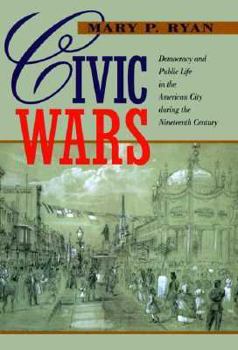Civic Wars: Democracy and Public Life in the American City during the Nineteenth Century
Select Format
Select Condition 
Book Overview
Mary P. Ryan traces the fate of public life and the emergence of ethnic, class, and gender conflict in the nineteenth-century city in this ambitious retelling of a key period of American political and social history. Basing her analysis on three quite different cities--New York, New Orleans, and San Francisco--Ryan illustrates how city spaces were used, understood, and fought over by a dazzling variety of social groups and political forces. She finds that the democratic exuberance America enjoyed in the 1820s and 1840s was irrevocably damaged by the Civil War. Civic life rebounded after the War but was, in Ryan's words, "less public, less democratic, and more visibly scarred by racial bigotry."
Ryan's analysis is played out on three different levels--the spatial, the ceremonial, and the political. As she follows the decline of informal democracy from the age of Jackson to the heyday of industrial capitalism, she finds the roots of America's resilient democratic culture in the vigorous, often belligerent urban conflicts that found expression in the social movements, riots, celebrations, and other events that punctuated daily life in these urban centers. With its insightful comparisons, meticulous research, and graceful narrative, this study illustrates the ways in which American cities of the nineteenth century were as full of cultural differences and as fractured by social and economic changes as any metropolis today.
Ryan's analysis is played out on three different levels--the spatial, the ceremonial, and the political. As she follows the decline of informal democracy from the age of Jackson to the heyday of industrial capitalism, she finds the roots of America's resilient democratic culture in the vigorous, often belligerent urban conflicts that found expression in the social movements, riots, celebrations, and other events that punctuated daily life in these urban centers. With its insightful comparisons, meticulous research, and graceful narrative, this study illustrates the ways in which American cities of the nineteenth century were as full of cultural differences and as fractured by social and economic changes as any metropolis today.
Format:Hardcover
Language:English
ISBN:0520204417
ISBN13:9780520204416
Release Date:June 1997
Publisher:University of California Press
Length:394 Pages
Weight:1.82 lbs.
Dimensions:9.5" x 1.3" x 6.5"
Customer Reviews
2 ratings
Brilliant book
Published by Thriftbooks.com User , 16 years ago
I recently read another of Ryan's books for a paper I was writing on woman's suffrage. I was so impressed, I looked up all her books. In one sense, "Civic Wars" continues on the theme of Ryan's: "Banners and Ballots" in examining the challenges that have historically stymied feminist historians in that so much of women's influence has consisted in the private (as opposed to public) sphere--making it not only harder to trace, but harder to document as well. But there is a broader analysis here, too--well beyond the scope of women-- examining all the 'have-nots' of society and the means by which they used the levers of public dissent and protest to have a say in their democracy. Ryan is a lucid and compelling writer and in this book she provides ample evidence that in Frederick Douglas' words: "Power cedes nothing without demand." Great book. P. Abeles
WHAT!!!!!!!
Published by Thriftbooks.com User , 24 years ago
While this book has terrific content, I did not care for the fact that I had to stop every page and look up words. When I took the GRE I scored in the 96 percentile. I have a strong vocabulary, however, half the time I did not know what Ryan was saying. This is an interesting book comparing the development of San Francisco, New York, and New Orleans. I would recommend it to anyone studying the 19 Century. You will need a dictionary to read the book, but you will learn a lot.






